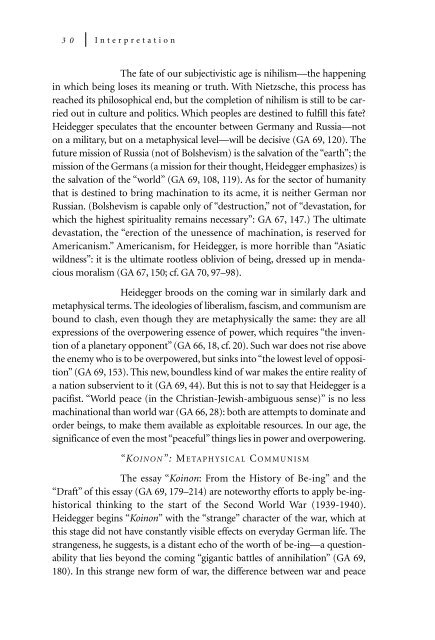Beyond Struggle and Power: Heidegger's Secret ... - Interpretation
Beyond Struggle and Power: Heidegger's Secret ... - Interpretation
Beyond Struggle and Power: Heidegger's Secret ... - Interpretation
Create successful ePaper yourself
Turn your PDF publications into a flip-book with our unique Google optimized e-Paper software.
3 0 <strong>Interpretation</strong><br />
The fate of our subjectivistic age is nihilism—the happening<br />
in which being loses its meaning or truth. With Nietzsche, this process has<br />
reached its philosophical end, but the completion of nihilism is still to be carried<br />
out in culture <strong>and</strong> politics. Which peoples are destined to fulfill this fate?<br />
Heidegger speculates that the encounter between Germany <strong>and</strong> Russia—not<br />
on a military, but on a metaphysical level—will be decisive (GA 69, 120). The<br />
future mission of Russia (not of Bolshevism) is the salvation of the “earth”; the<br />
mission of the Germans (a mission for their thought, Heidegger emphasizes) is<br />
the salvation of the “world” (GA 69, 108, 119). As for the sector of humanity<br />
that is destined to bring machination to its acme, it is neither German nor<br />
Russian. (Bolshevism is capable only of “destruction,” not of “devastation, for<br />
which the highest spirituality remains necessary”: GA 67, 147.) The ultimate<br />
devastation, the “erection of the unessence of machination, is reserved for<br />
Americanism.” Americanism, for Heidegger, is more horrible than “Asiatic<br />
wildness”: it is the ultimate rootless oblivion of being, dressed up in mendacious<br />
moralism (GA 67, 150; cf. GA 70, 97–98).<br />
Heidegger broods on the coming war in similarly dark <strong>and</strong><br />
metaphysical terms. The ideologies of liberalism, fascism, <strong>and</strong> communism are<br />
bound to clash, even though they are metaphysically the same: they are all<br />
expressions of the overpowering essence of power, which requires “the invention<br />
of a planetary opponent” (GA 66, 18, cf. 20). Such war does not rise above<br />
the enemy who is to be overpowered, but sinks into “the lowest level of opposition”<br />
(GA 69, 153). This new, boundless kind of war makes the entire reality of<br />
a nation subservient to it (GA 69, 44). But this is not to say that Heidegger is a<br />
pacifist. “World peace (in the Christian-Jewish-ambiguous sense)” is no less<br />
machinational than world war (GA 66, 28): both are attempts to dominate <strong>and</strong><br />
order beings, to make them available as exploitable resources. In our age, the<br />
significance of even the most “peaceful” things lies in power <strong>and</strong> overpowering.<br />
“KOINON”: M ETAPHYSICAL C OMMUNISM<br />
The essay “Koinon: From the History of Be-ing” <strong>and</strong> the<br />
“Draft” of this essay (GA 69, 179–214) are noteworthy efforts to apply be-inghistorical<br />
thinking to the start of the Second World War (1939-1940).<br />
Heidegger begins “Koinon” with the “strange” character of the war, which at<br />
this stage did not have constantly visible effects on everyday German life. The<br />
strangeness, he suggests, is a distant echo of the worth of be-ing—a questionability<br />
that lies beyond the coming “gigantic battles of annihilation” (GA 69,<br />
180). In this strange new form of war, the difference between war <strong>and</strong> peace
















